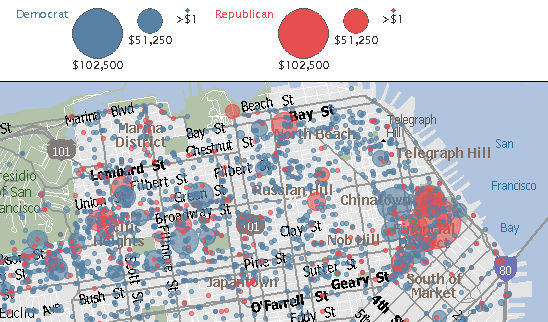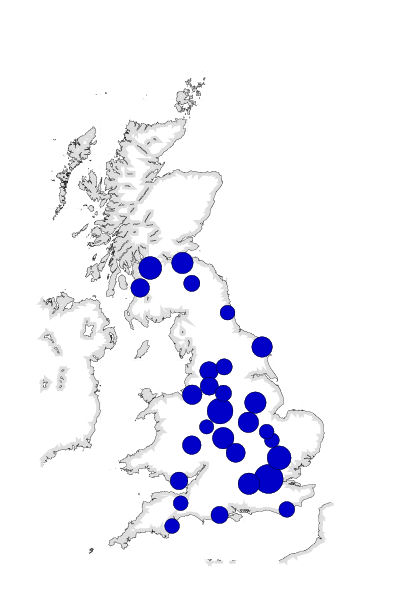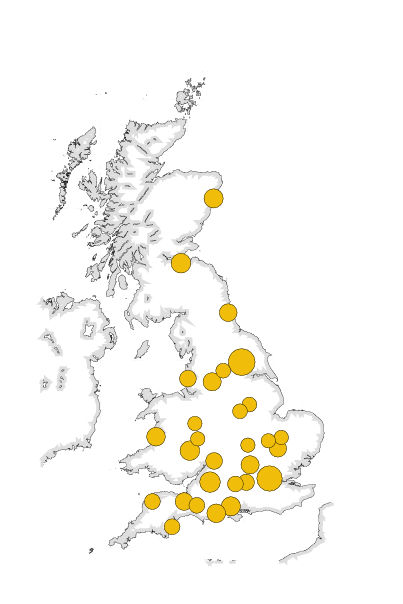So, there was an interesting piece in the Economist this week on the funding of political parties, which mentioned the splendid Fund Race site which lets residents of the United States determine how much cash their neighbours have given to America's two political parties. It produces beautiful maps liks this one:
showing donations by individuals and companies overlaid on street maps. No doubt this makes for interesting discussions in the elevator.
When I first saw the Fund Race site, it occured to me that it would be interesting to do the same thing for the UK. Here, data about political donations is held and published by the Electoral Commission under the Political Parties, Elections and Referendums Act 2000. (Parties themselves are registered under a 1998 Act; I have to say the idea of the state acknowledging the existence of political parties makes me uneasy, but since I'm also in favour of state funding for parties it's clear that my views in this area could do with a little tidying up....)
However, for reasons of privacy, donations by individuals to the various parties -- although recorded -- are not published with their addresses, so it's not possible to map individual, personal donations as with Fund Race. Donations by corporate bodies are recorded with their addresses, but the results aren't very informative: (these show the data for 2003; there are fewer circles than donations, because I've amalgamated circles which overlap too much to be clear)
And before anyone complains, yes, I know the circles should have areas proportional to the sizes of the donations (rather than proportional to the log of the donations, as here). But doing it `properly' gives ridiculous results -- firstly, because the Labour party received so much money than all the other parties look insignificant in comparison -- Labour got £14 million, as opposed to about £4.4 million for the Tories and £1.4 million for the Liberal Democrats, not counting public money and donations from trusts; and secondly, because so much money is donated from addresses registered in London that all you see is a great big circle obliterating the south-east, plus scattered pustules across the rest of the country -- probably a bit like the maps Soviet war planners would have drawn, I suppose.
Actually this whole exercise is a bit pointless because the UK is so centralised. Many Labour party donations, for instance, come from trades unions whose headquarters are in London, even though their members work all over the country. Similarly, Tories get donations from big companies (boo!) which are mostly based in London. (Actually Labour seem to get more donations from big companies....) Liberal Democrats don't really seem to get many donations at all, but many of them come from Liberal clubs all over the country, which I suppose is a bit more reasonable.
The Economist article also suggested that,
Perhaps giving, like voting, should be anonymous? Voting was actually public in America until the end of the 19th century. Ian Ayres, a professor at Yale Law School and co-author of Voting with Dollars, thinks the answer is private donation booths; these would prevent candidates from knowing whom they owed special favours, just as secret ballots do. But if campaign gifts were anonymous, there would probably be fewer of them.
The point here being that you might give a large sum of money to, say, a British political party, in return for which that party, when in government, might (for instance) not ban tobacco advertising in your sport, or buy a large quantity of a probably-useless pharmaceutical product from your company; or you might give a large sum of money the an American political party, in return for which a future president from that party might (for instance) invade the Middle Eastern country of your choice or let you drill for oil in an unspoiled wilderness. And even if the bribery did not work -- and, for the avoidance of doubt, all of the above examples are, of course, completely hypothetical -- the perception of bribery is itself corrosive, and therefore to be avoided.
The secret ballot is intended to stop intimidation of voters by candidates, by making it impossible for voters to prove how they have voted. Similarly the idea here is that, if it is impossible for a party to find out who gave them their cash, they won't know what they've been bribed to do. (Note that I'm -- naturally -- assuming the basest of motives here.)
Unfortunately this won't work. In the donation case, both the donor and the party have an interest in finding out who's responsible for which donations (the donors, so that the party is given the correct incentives, and the party, so that it knows what it's being paid to do). And they have rather a lot of information to go on, which must be recorded because the party has to keep its accounts in order. In the simplest case, I can give a party an arbitrary sum of money of about the right size (say, £3,080.17 or whatever), and then ring them up and say ``I am the donor who gave you £3,080.17 on such-and-such a date, and I'd like you to do the following favour for me''. You might think that you can close down the hole by not reporting donations to parties individually, but funnelling them through some external agency which adds the amounts together, but that just makes the task harder, not impossible. For instance, if every week's donations are aggregated, I can give £x in the first week, £y in the second, £z in the third, and so forth, and report the values of x, y, z, etc. to the recipient, who can compare them to the totals in each week and -- if the values are chosen carefully -- determine with confidence whether the donation was actually made or not.
Some readers will spot the analogy with, for instance, this story about `covert channels' in the design of MULTICS; it's interesting if a bit technical, but the point is that if two parties can exchange any information (however limited the amount), it's possible for them to communicate with one another. (Note for the pedants: this hypothetical example isn't quite the same as the MULTICS one.) I believe that the same sorts of problem have arisen in the design of (e.g.) spectrum auctions to telecoms companies.
I don't think that this is an argument for state funding of political parties, but it's certainly an argument against one of the alternatives.




